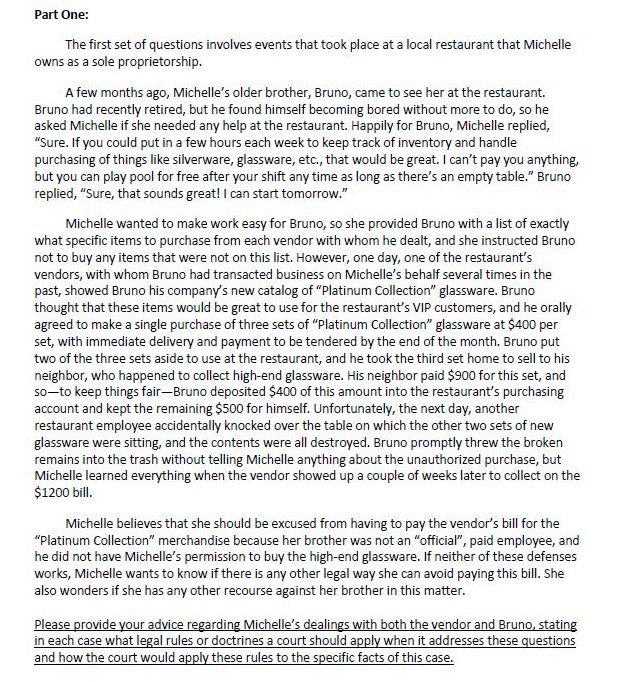Using the IRAC method, analyze this case.
Part One: The first set of questions involves events that took place at a local restaurant that Michelle owns as a sole proprietorship. A few months ago, Michelle's older brother, Bruno, came to see her at the restaurant. Bruno had recently retired, but he found himself becoming bored without more to do, so he asked Michelle if she needed any help at the restaurant. Happily for Bruno, Michelle replied, "Sure. If you could put in a few hours each week to keep track of inventory and handle purchasing of things like silverware, glassware, etc., that would be great. I can't pay you anything, but you can play pool for free after your shift any time as long as there's an empty table." Bruno replied, "Sure, that sounds great! I can start tomorrow." Michelle wanted to make work easy for Bruno, so she provided Bruno with a list of exactly what specific items to purchase from each vendor with whom he dealt, and she instructed Bruno not to buy any items that were not on this list. However, one day, one of the restaurant's vendors, with whom Bruno had transacted business on Michelle's behalf several times in the past, showed Bruno his company's new catalog of "Platinum Collection" glassware. Bruno thought that these items would be great to use for the restaurant's VIP customers, and he orally agreed to make a single purchase of three sets of "Platinum Collection" glassware at $400 per set, with immediate delivery and payment to be tendered by the end of the month. Bruno put two of the three sets aside to use at the restaurant, and he took the third set home to sell to his neighbor, who happened to collect high-end glassware. His neighbor paid $900 for this set, and so-to keep things fair-Bruno deposited $400 of this amount into the restaurant's purchasing account and kept the remaining $500 for himself. Unfortunately, the next day, another restaurant employee accidentally knocked over the table on which the other two sets of new glassware were sitting, and the contents were all destroyed. Bruno promptly threw the broken remains into the trash without telling Michelle anything about the unauthorized purchase, but Michelle learned everything when the vendor showed up a couple of weeks later to collect on the $1200 bill. Michelle believes that she should be excused from having to pay the vendor's bill for the "Platinum Collection" merchandise because her brother was not an "official", paid employee, and he did not have Michelle's permission to buy the high-end glassware. If neither of these defenses works, Michelle wants to know if there is any other legal way she can avoid paying this bill. She also wonders if she has any other recourse against her brother in this matter. Please provide your advice regarding Michelle's dealings with both the vendor and Bruno, stating in each case what legal rules or doctrines a court should apply when it addresses these questions and how the court would apply these rules to the specific facts of this case







